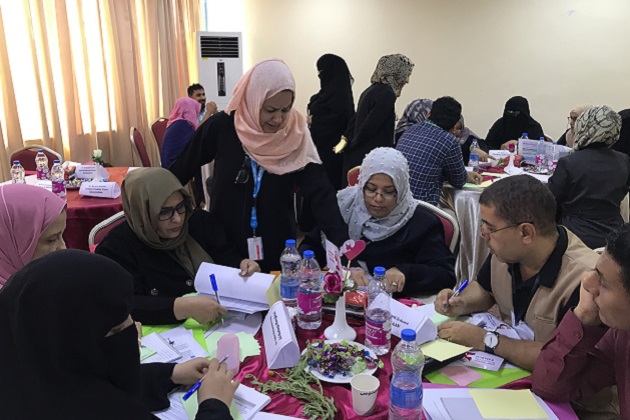March 2019 - The Yemen Health Cluster, with support from the Global Health Cluster, organized two workshops on Sexual Reproductive Health (SRH) prioritization on 25-26 February in Sanaa and 9-10 March in Aden. The aim of the workshops was to build country capacity on the transition from the Minimum Initial Service Package (MISP) to a Comprehensive Package of Reproductive Health Services (CSRH), and ultimately contribute to better health outcomes of women and girls in Yemen.

Under the leadership of the Ministry of Public Health and Population, participants developed a work-plan based on a prioritization exercise that highlighted what was reasonable, achievable and measurable on sexual and reproductive health in the next year. “Planning is the basis of the work and the first element of effective management”, said Dr Moslah Altaw’ali, Deputy Minister of Public Health and Population.
Recent UN figures suggest Yemen holds one of the highest maternal mortality rates in the region at up to 385 maternal deaths per 100,000 live births. In 2013, unmet need for contraception was estimated at 29%, while in the context of the current conflict, this is now estimated at 31.7%. “Many women are at risk of having severe pregnancy related complications with immediate danger to their lives, due to limitation of access to the services", mentioned Dr Mohira Baboeva, Project Manager, Sexual and Reproductive Health and Rights project
These workshops demonstrated the commitment of the Ministry of Health and Yemen Health Cluster partners to serve the population in need. “Joint coordination of work between the Ministry of Health and Health Cluster partners is key to avoid duplication of resources,” said Dr Jamshed Tanoli, Health Cluster Coordinator.

The Sanaa workshop took the innovative approach as a training of trainers with the aim to have capacity on the ground to run additional workshops on MISP to CSRH transition. Four facilitators were empowered with technical knowledge, as well as with facilitation techniques. Facilitators were from WHO, the Yemen Health Cluster, UNICEF and UNFPA.
The workshops were attended by 89 participants from the Ministry of Public Health and Population and several partners, both national and international nongovernmental organizations and UN agencies: Save the Children International (SCI), Building Foundation for Development (BFD), Charitable Society for Social Welfare (CSSW), Relief International (RI), National Yemen Midwifery Association (NYMA), Yamaan Foundation for Health and Social Development (YAMAAN), International Medical Corps (IMC), Health and Education Association (SAWT), Field Medical Foundation (FMF), Marie Stopes International (MSI), UNICEF and UNFPA.
This initiative was part of a wider effort aiming at delivering integrated Sexual Reproductive Health Rights services in emergencies through the Health Cluster. With funding from The Netherlands, WHO in collaboration with UNFPA, is implementing a project to build the capacity of Health Cluster partners to address unmet reproductive health needs of women and girls in Bangladesh (Cox’s Bazar), the Democratic Republic of the Congo (Kasaï) and Yemen, through cluster and sector coordination mechanisms.
Read more on the Minimum Initial Services Package (MISP) for SRH in crisis situations
